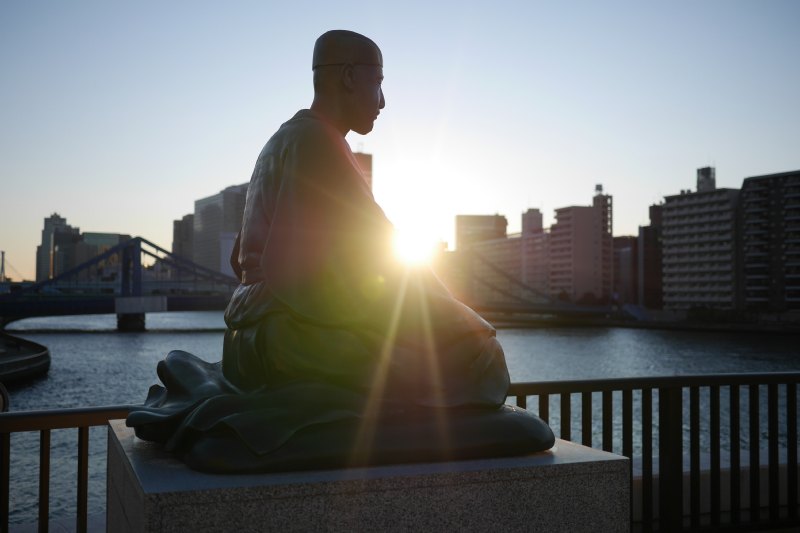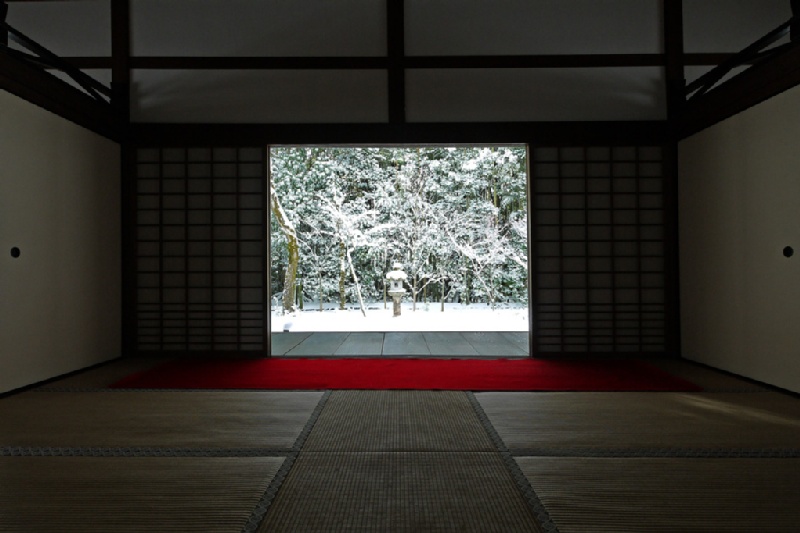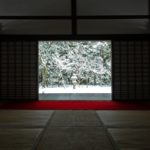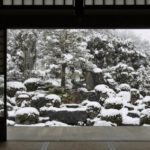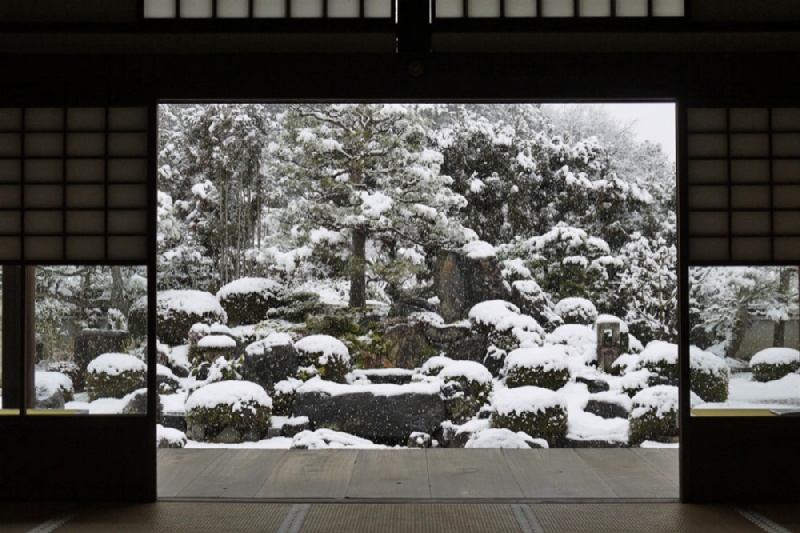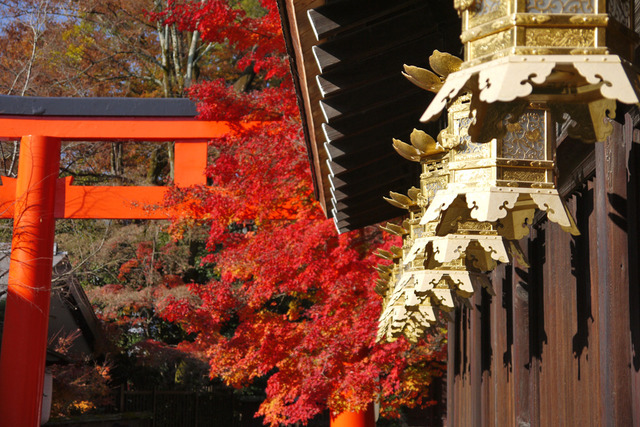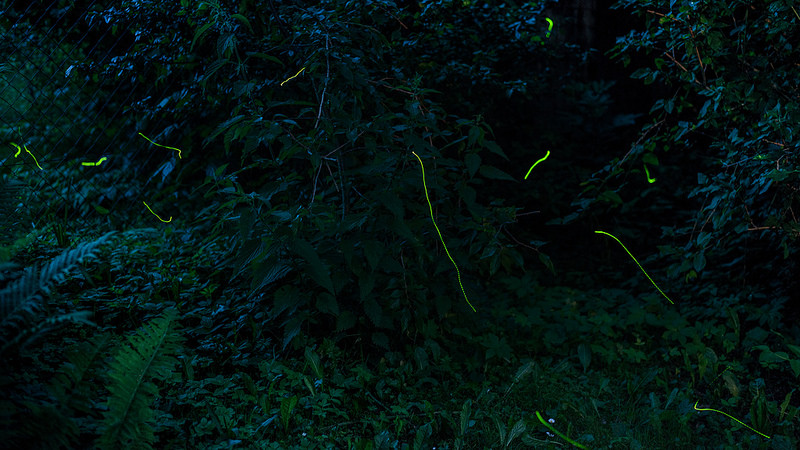Izumi Shikibu(978?-?) is one of the greatest woman poet in Japanese history. She was the contemporary of Murasaki Shikibu, who is best known for her 54-chapter epic novel, the Tale of Genji. Her waka is characterized by overwhelming sentimental tone in view of the time she lived. She went through a lot of relationship issues, like those described in fairy tales or films, such as romance crossing over differences of social rank and subsequent scandal, and another with her ex’s brother and sudden painful losses of loved ones. But whether having knowledge of her background or not, we all find her songs and herself endearing through her works.
和泉式部は日本の文学史上指折りの歌人です。『源氏物語』で有名な紫式部と同時代を生きた彼女の和歌は、その時代としてはかなり熱い想いにあふれたものとなっています。様々な愛のもつれを経験した彼女ですが、それはまるでおとぎ話か映画のようです。たとえば、身分違いの恋とスキャンダル、死別した元恋人の弟との恋、そして死別。しかし、こうした背景知識の有無にかかわらず、彼女の和歌とそこに滲む彼女の人間性に触れると愛さずにはいられないのです。
She is well-known for her sequence of affairs at the court. She got married at the age around 18 or 19 to Tachibana no Michisada, who soon became governor of Izumi. While in her marriage, she was in love with Emperor’s son, Prince Tametaka, who died young in the middle of their relationship. After her divorce, she was then courted by Tametaka’s brother, Prince Atsumichi, who also died a few years later. The first ten months of this affair are described in her semi-autobiography, a composite of prose and poetry, Diary of Izumi Shikibu. After having started serving at the court, she married to Fujiwara no Yasumasa, an acclaimed governor, who was about 20 years older than her. It is at this point that she wrote the following waka with the prefatory note saying, “When my lover started getting distant, detached and coming over less often, I visited Kibune and saw fireflies flitting here and there over the creek.”
宮廷での様々な恋で知られる彼女ですが、和泉守となる橘道貞との結婚が18・19歳ごろと言われています。結婚後、為尊親王と恋に落ちますが、親王はその関係の只中で亡くなってしまいます。離婚の後に、弟君である敦道親王との恋もまた、親王がその数年後に亡くなり終わりを迎えます。この二人の関係の最初の10か月ほどの様子が描かれているのが、和歌と散文で綴られた半自伝的な『和泉式部日記』です。その後宮仕えを始めると藤原保昌と結婚。彼は、20歳ほど年上の非常に有能な受領でした。そのころに彼女が詠んだのが、以下の和歌なのですが、詞書があります。「男に忘られて侍けるころ貴船にまいりて、みたらし河に蛍のとひ侍けるをみてよめる(彼が通ってこなくなってしまったので、貴船に参った折、御手洗川に蛍が飛び交うのを見て詠んだ)」
物思へば沢の蛍も我身よりあくがれ出づる玉かとぞみる
mono omoheba sawano hotarumo wagamiyori akugare ni keru tamatozo miru
O Fireflies flashing over the stream
I thought of you as my soul straying out of my body
While heartbroken, lost in thoughts
悩み事を抱えてあれこれ考えていた
辺りで明滅する蛍が
自分の身体から彷徨い出た魂かのように見えた
And this is something more than a lovesick song. The first question to be discussed is “soul leaving your body”. It was believed that the soul is capsulated in the body but it flushes out of the body at times of deep and pensive thought. That is called “Akugaru (leaving and yearning)”. How can these stray souls make out the right path then? She had the answer in another waka.
これはただの恋の苦しみを歌った歌ではありません。まず考えなければならないのは、「身体から彷徨い出た魂」についてです。魂とは身体の中に納められいますが、深い物思いに沈んでいると、身体から彷徨い出てきてしまうと考えられていました。それが「あくがる」なのです。では、どうしたら彷徨い出た魂は正しい道を見つけられるのでしょうか。
冥きより冥き道にぞ入りぬべきはるかに照らせ山の端の月
kuraki yori kuraki michini irinubeki harukani terase yamanohano tsuki
We are to walk in darkness
Towards the realm of craving and cluelessness
O the moon peeking over the hills in the distance
Let your heavenly light shine before us
煩悩の暗い道から また暗い道へと入って行ってしまうのだろう
山の端で光る月よ この道を照らしてください
It is believed that she composed this waka in her early 20’s. It sounds like she was anticipating suffering in her later life, where her soul burned with the pain of unassuaged longing. The moonlight symbolizes the Buddhism truth that reorients people from spiritual defilement towards liberation. Those she loved were gone in the middle of romantic relationships. All her longing was on hold and adrift in darkness just as fireflies flitting about. She knew that she had to do something to get back on the right track; but, as the same time, she knew that there was nothing to be done about it. All she had to was look upon the moon and make a prayer.
この和歌は、和泉式部が20歳ごろにつくられたとされています。心の中で燻り続けるあこがれに魂が灼かれる、そんな人生の苦難を予言していたかのようです。月の光は、煩悩にまみれた衆生を悟りへ導く真理。彼女が愛した人は、その関係の途中でこの世を去ってしまった。彼女のあこがれは留め置かれたまま、飛び交う蛍のように暗闇を漂う。正しい道に戻るべきとわかっていても、どうしようもないという気持ちにも苛まれる。月を見上げ、祈るしかない。
Another point to be made here is about her second husband, Yasumasa. Some critics argue that Izumi Shikibu didn’t have a happy marriage with him. She composed the song of fireflies when he didn’t frequent her place. Let’s think about their state of love in his shoes. He knew that she was madly in love with brothers of noble family consecutively, which was a huge scandal at the court, and he also sensed that her love and longing were still directed towards those two old lovers, not him. He was great at business, but deep down he would probably feel confused, try to distance himself, pull back. So he was seemingly less interested in their own relationship. This obviously makes for a good amount of angst on both parties. Probably both needed to deal with their own feelings in a way the other just don’t understand. This sounds a universal relationship issue, but that state of uncertainty and hesitancy is the very arena where people care about each other and try to step into vulnerability and possibility beyond.
ここでもう一つ考えるべきことがあります。二人目の夫保昌についてです。保昌と和泉式部の結婚生活はうまくいっていなかったと指摘されていますが、確かに、蛍の歌を書いたころ、保昌はあまり彼女のもとに通ってきてはくれなかったようです。彼の立場で、二人の関係を考えてみましょう。保昌は、和泉式部が親王と続けて熱烈な恋愛関係にあったこと、それが宮廷でスキャンダルとなったことを知っていて、また、彼女の愛と想いは、自分にではなく、この二人に向けられていることも感じとっていた。職業人として名声を得ながらも、心の奥底は乱れ、少し距離を置いてみようとか、身を引いてみようと思ったかもしれません。それが冷え切った関係という風に受け取られたかもしれません。保昌にとっても、和泉式部にとっても、これは大きな心の負担となったことでしょう。自分なりにこの感情と向き合うわけですが、それは、それぞれ、相手にはできなかったかもしれません。いつの時代にもある恋愛の悩みのようですが、こうした不安と躊躇こそが、相手への思いやりの表れであり、自分の弱さにも向き合うことで、可能性も開けてくるということを表しているように思えます。
What makes her poems so attractive is that her life can be seen as a composite of sense and sensitivity, faith and fear, bravery and fragility. Stepping forward while knowing you never get back on the right track, awkwardly reaching out a hand to grab hold of truth, shuttling between two different attitudes towards life, consuming time caring about someone. All that we do in longing, caring are in the attempt.
彼女の和歌が魅力的なのは、理性と感性、信仰と恐れ、勇気と脆さ、こうしたものが混じり合っているからではないでしょうか。うまくいかないとわかっていながら踏み出す一歩、真実を求めて恐る恐る差し出す手、大きく異なる人生の向き合い方で試行錯誤、誰かを思って費やす時間。こうしたあこがれと思いやりの気持ちこそが、届くかわからないものに手を伸ばすということではないでしょうか。





